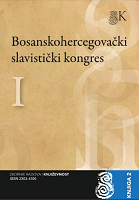Motivi ranih majčinskih praksa unutar konstrukcije književnih ideologema (Melita J. E. Tomića i Mati Mare Švel-Gamiršek)
Motifs of Early Maternal Practice within Literary Ideologeme Construction (Melita by J. E. Tomić and Mati by Mara Švel-Gamiršek)
Author(s): Kornelija Kuvač-LevačićSubject(s): Gender Studies, Comparative Study of Literature, Croatian Literature, Theory of Literature, Sociology of Literature
Published by: Slavistički komitet BiH
Keywords: early maternal practices; literary ideologeme; patriarchal construction; “open” body; femme fatale; idealized woman;
Summary/Abstract: Issues of motherhood and female body autonomy in two Croatian writings are the topic of this literary analysis. My starting point was that motifs of early maternal practice (which are pregnancy, birth, breastfeeding as defined by Cristina Mazzoni, and to which I have added a motif of puerperium) could be observed as an element of author’s literary ideologeme. I did a research on influence of patriarchal construction on early motherhood, which is most tightly connected to female body issues. Experience of a pregnant or a birth giving body, or an “open” female body, as defined by M. Bakhtin, was almost absent or omitted in the largest part of our cultural discourse about human experience and history. Josip Eugen Tomić in his novel Melita (1899) represented a model of literary femme fatale through negative relationship of the main female character, Melita, to her own early maternal practice and to motherhood in general. Melita, who is a half-foreigner, almost ruined life of her husband, an idealized Croatian civilian. Unlike him, another Croatian writer, Mara Švel Gamiršek in her story Mati [Mother] (1942) represented a model of an idealized, healthy country Croatian woman who gave birth several times in succession. Her attitude towards pregnancy was completely positive, in spite of poverty, hard work and of her milieu’s mockery. Mara Švel Gamiršek achieved the idealized Croatian mother as ideologeme, within the patriarchal pattern of social values, which was correlated to historical moment of this writing. I did a research in what degree both of the authors pursue their ideological patterns and whether it is even possible to find any signs of psychological grading and individualizing of the main female protagonists in their relationship to their own bodies and destiny.
Journal: Bosanskohercegovački slavistički kongres
- Issue Year: I/2012
- Issue No: 2
- Page Range: 321-335
- Page Count: 15
- Language: Croatian

